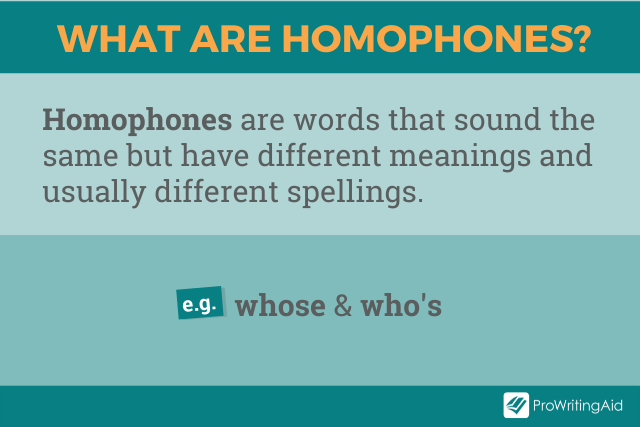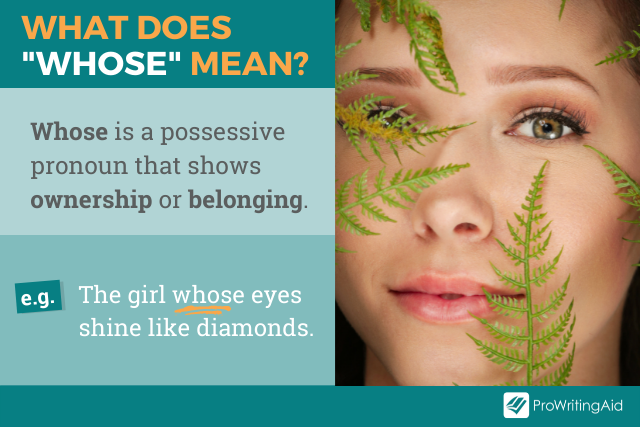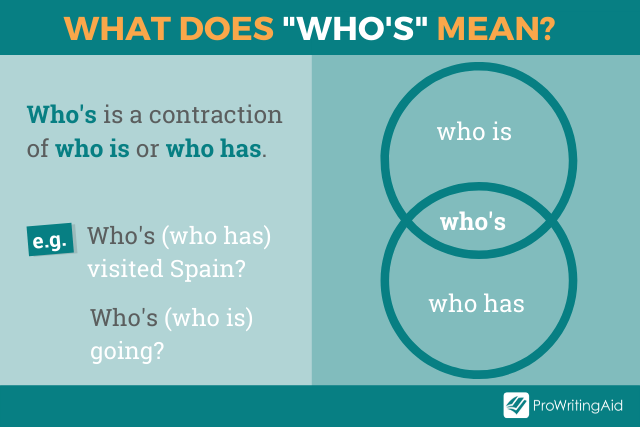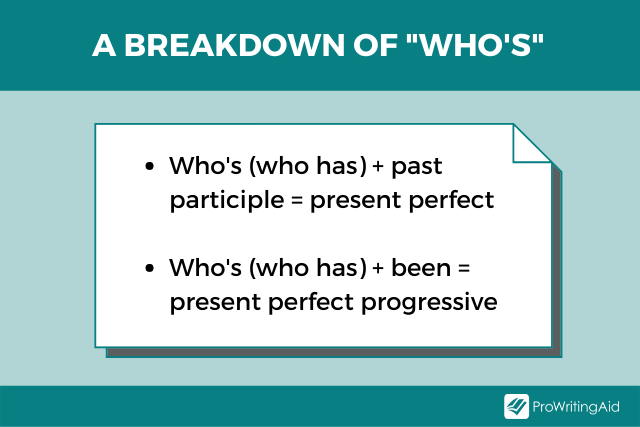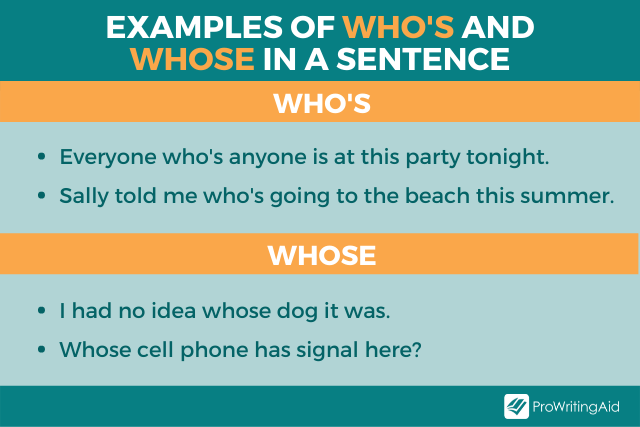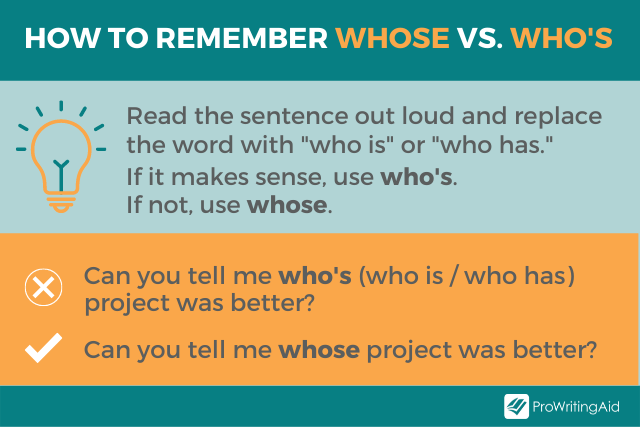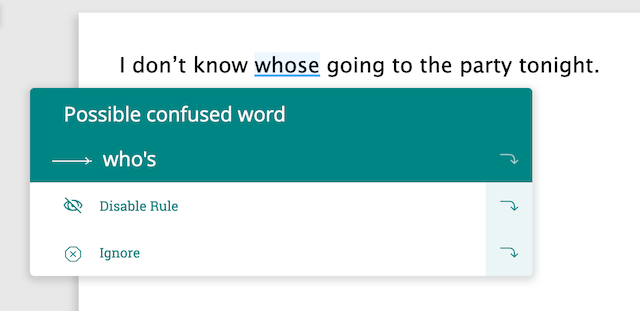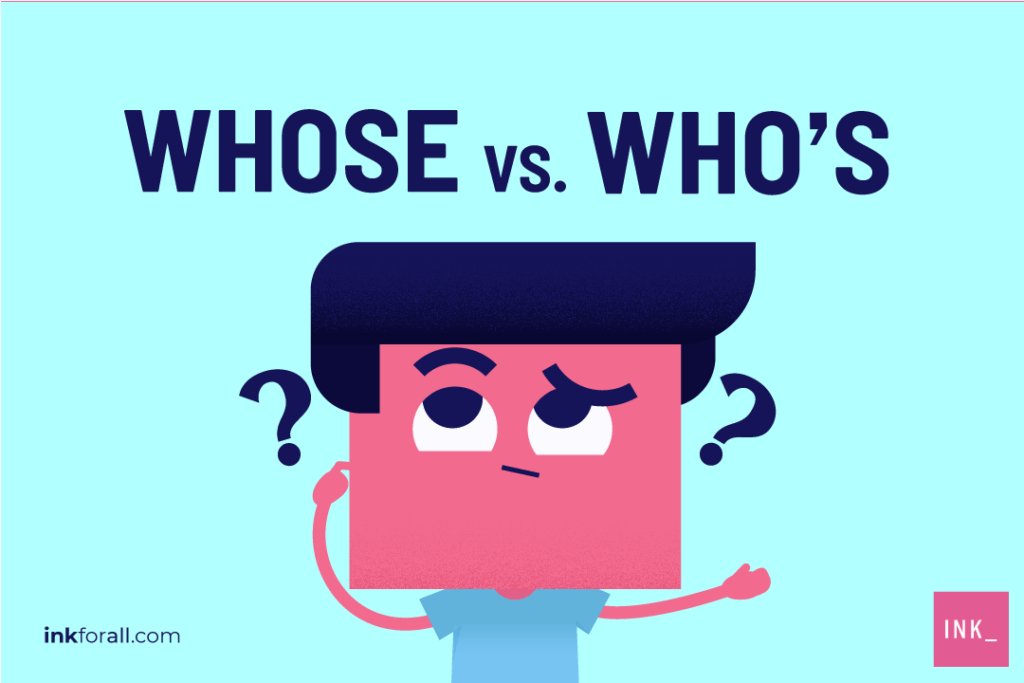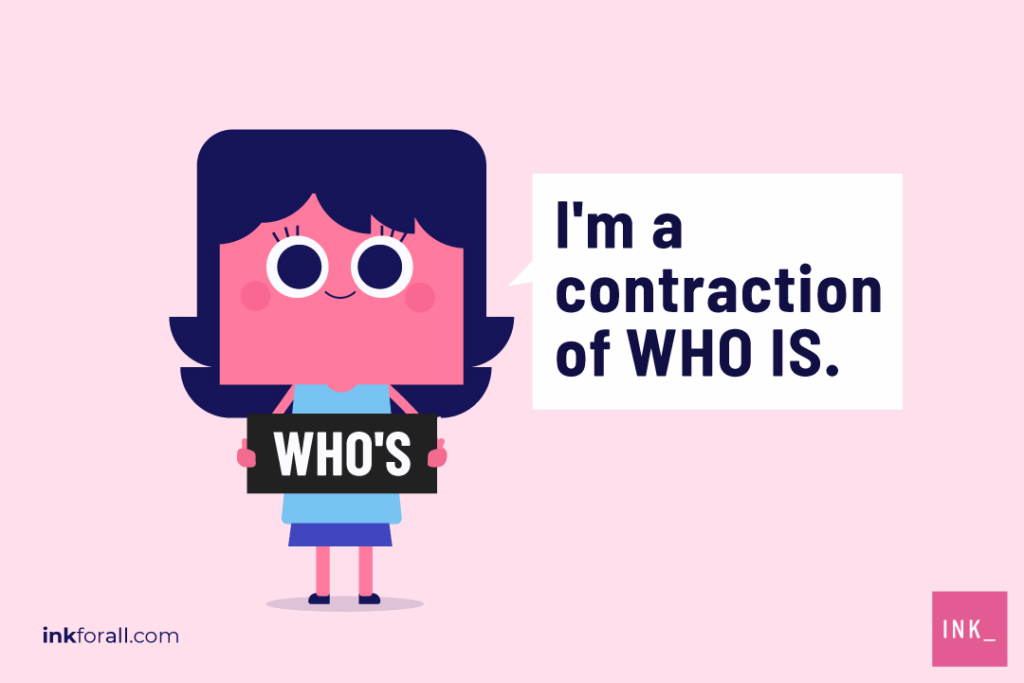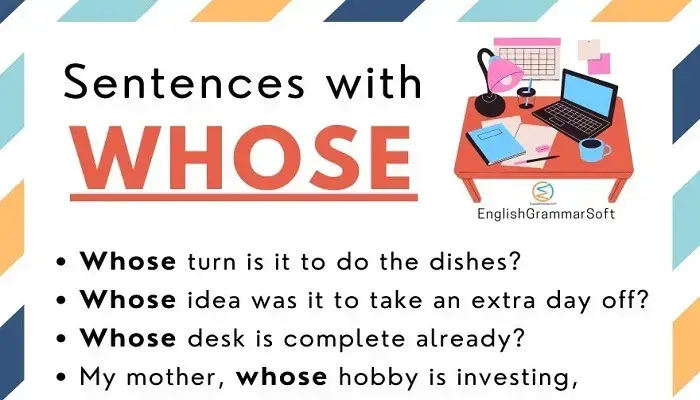 Pin
Pin
‘Whose’ is a relative pronoun used to express possession. You will find here 70 example sentences with whose.
You can use whose when you wish to say that something or someone belongs to or is related to a particular person
- Whose turn is it to do the dishes?
- Whose idea was it to take an extra day off?
- Whose desk is complete already?
- My mother, whose hobby is investing, regularly tries to get me involved in her newest market idea.
- You’d better apologize for whose money you borrowed for your vacation.
- It’s the man whose house it is.
- There was an older woman whose husband was a tailor.
- It’s a good thing to be in your debt, but not your debt whose icy foam turns men into moral monsters.
- The actor, whose career was over, is coming back.
- The man whose son is my boss got the promotion.
- The girl whose sister I met at the party had small eyes.
- The lady, whose name I forgot, came with her husband.
- Sally drove the car whose number had just passed me.
- This building is full of people whose names I don’t know.
- It is the bank whose codes were used was in Baltimore.
- This problem, whose solution requires skill and patience, is virtually impossible to solve.
- Hiroshima is the city whose name has become the symbol of humanity.
- An audience whose members tend to be quite critical determines whether a performance is good or bad.
- Whose shoes are the most comfortable?
- Do the children know whose birthday it is?
- The teacher knew whose work was best.
- The committee met to decide whose idea would be chosen.
- He did not wish to adopt the child whose mother had died in childbirth.
- I am told that there is a man whose face has been burned beyond recognition in your town.
- I didn’t realize whose house it was.
- I think that it’s the minister whose nephew killed someone.
- The bank whose money was stolen has claimed the insurance.
- The photo of the girl whose mother is a famous pop star is on the cover of this issue.
- Whose book is on your desk?
- Whose dirty dishes are these in the sink?
- The man whose coat you borrowed is my uncle.
- Whose car is parked outside?
- Whose clothes are these?
- Whose computer was hacked into?
- Whose team won the game?
- Whose idea was it to book the tickets six months in advance?
- It was a man whose ambition far exceeded his talent.
- She had a novel whose characters never really came to life.
- It was an actor whose performance was greatly appreciated by the audience.
- People whose houses were destroyed by the hurricane have been given free housing for six months.
- The company whose shares collapsed last month has had its financial figures taken into account by the purchasing committee at my firm, which led to a small amount of relief on my end.
- Many corporations whose stocks spiked earlier today announced late-night press conferences with their CEOs that should reveal why the sudden growth in their stock price.
- Into whose hands did they fall?
- To whose apartment did he come?
- Through whose eyes do I see the world?
- On whose authority do you act?
- Under whose direction will the work be done?
- In whose honor are we gathered tonight?
- Never squeeze the orange with whose skin has been peeled off due to health reasons.
- A word whose meaning changes depending on its use is called a relative pronoun.
- All of the people whose houses were burnt down were given new houses.
- Fries are the food whose consumption is most unhealthy in the USA.
- The portrait whose colors have faded was painted a long time ago.
- I’m looking for a book whose title begins with `H.’
- The teacher, whose car broke down, was caught by the bus.
- We stayed in a flat whose garden was full of noisy birds.
- The man whose house we burgled had been away for months.
- The woman whose husband I met at the dance looked very pretty.
- The coat with whose collar was covered in snow was mine.
- For whose tuition he was borrowing the money, the child had failed the exam again.
- For whose care she was making all the arrangements, the family had stopped contacting her.
- The lady whose husband works in a bank will leave tomorrow.
- The man whose daughter wants to be an actress will come tomorrow.
- The man whose son didn’t go to school will go to the party tonight.
- The woman whose sister is a nurse will call you tomorrow.
- The teacher whose car has just been towed off the school parking lot will be unhappy.
- The child whose house was broken into over the weekend will be scared for a long time.
- A child whose parents are divorced has to face the consequences.
- A person whose credit card is stolen is upset.
- A family whose home is threatened by fire is feeling distressed.
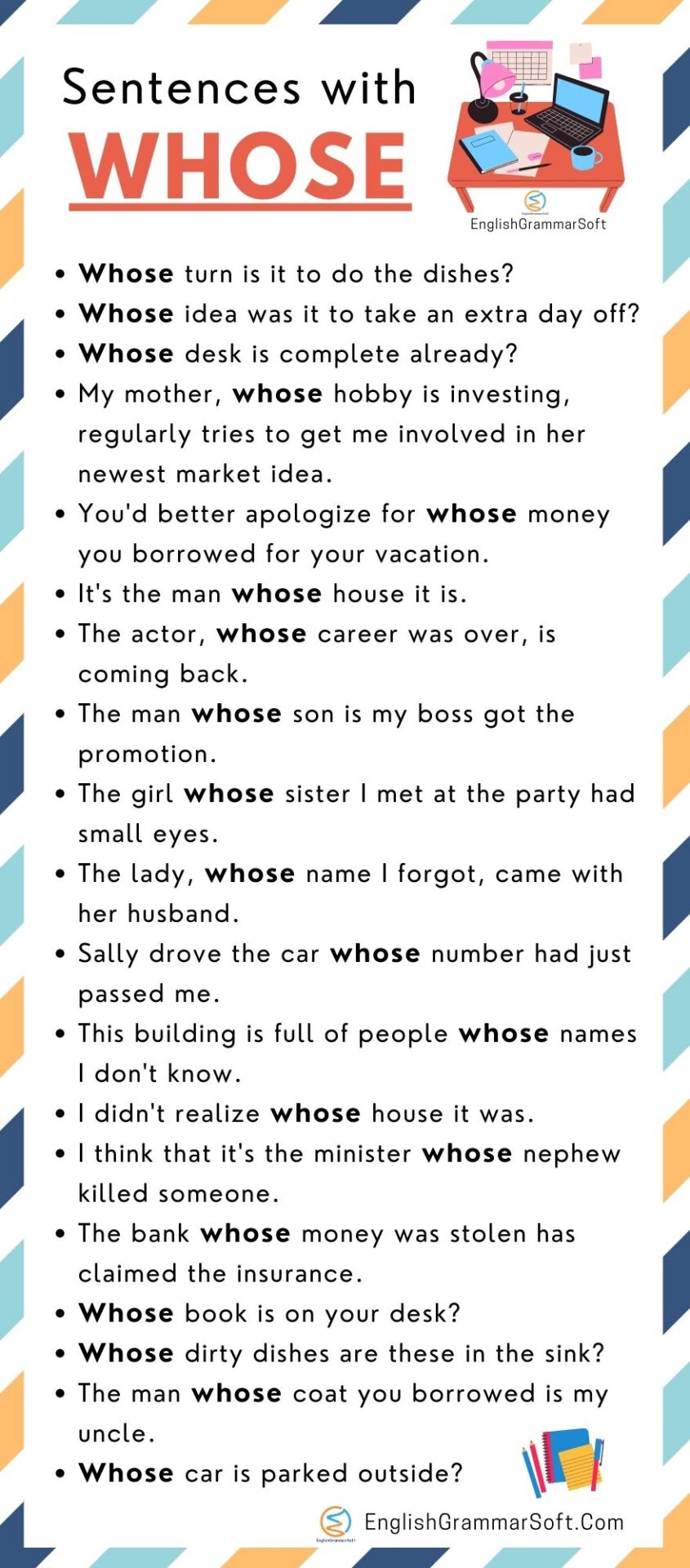
You may also like
- Sentences with Future Perfect
- Sentences with Past Perfect
- Conjunction Sentences (50 Examples)
- Sentences with Although Conjunction (87 Examples)
- No Sooner Than Sentences (31 Examples)
- Examples with Neither Nor (50 Sentences)
- Sentences with Commas (50 Examples)
- Sentences With Semicolons (;) 50 Examples
- Sentences with Apostrophes (Possession & Contraction)
- Example Sentences with Yet Conjunction
- Sentences with Either – or
- Sentences with Furthermore
- Sentences with Too
- Make Sentences with Too Many
- Make Sentences with Too Much
- Sentences with Juxtapose
- Sentences with Then and Than
- 50 Example Sentences with However
- 31 Example Sentences with Kinsmen
- Do Does Did Sentences (50 Examples)
- Has Have Had use in sentences | 50 Examples
- Was Were Sentences | 50 Examples
- There is – There are Sentences | 50 Examples
- Is am are sentences in English (50 Examples)
What Is the Difference Between Whose and Who’s?
Whose vs. who’s is one of the easiest mix-ups in English. Even though both words contain «who,» they have different meanings and are different parts of speech. This difference means that the two words can’t be used interchangeably.
In short, the difference can be summed up like this:
- Whose is a possessive pronoun indicating who owns something
- Who’s is a contraction that is short for «who is» or «who has.»
To better understand the difference between whose vs. who’s, we need to dive deep into the definitions of each word, as well as their grammar functions. Let’s get started!
Whose and who’s are tricky homophones. These words sound alike, but they don’t have the same meaning at all.
Keep reading to learn more about the difference between whose and who’s.
What Does Whose Mean?
Whose is used to indicate that something belongs to or is associated with a person or thing that has previously been mentioned.
- The dog, whose paw prints were all over the carpet, looked guilty.
Here, whose means that the dog is associated with the paw prints—he left them on the carpet.
Because whose doesn’t give us enough information on its own to work out who someone is talking about, it is used after you have already mentioned a specific thing or person, or in a question when you don’t know who you are talking about.
This gets easier with examples:
- The man, whose hair was bright orange, stood out from the crowd.
In this sentence, whose shows that the hair being talked about belongs to the man. Without referencing the man first, we wouldn’t know what subject whose was referring to.
But if we want to know who something belongs to, we can use whose in a question, like this:
- Whose paw prints are these?
What Kind of Word Is Whose?
Okay, now we’re going to get a bit more grammatical.
Whose is technically always a possessive pronoun. That means that it shows possession or ownership. For example, in the question «Whose phone is this?» you’re asking who owns the phone.
However, whose is also often used as a possessive adjective. What does this mean? It takes a few steps to explain.
A pronoun (like he, she, it) is a word that replaces a noun (a thing, person, or idea), especially a proper noun (a name).
Whose is a possessive pronoun, which means it shows possession or ownership. It replaces the person or thing to whom something belongs in a sentence.
Look at the following example.
- The girl whose eyes shine like diamonds
In this example, whose is showing that the eyes belong to the girl. But it’s also doing something else. At the same time, it is telling us which girl we are talking about by describing her.
Because of this dual function, this possessive pronoun is also functioning like a possessive adjective. It’s a stand-in for the girl, like a pronoun, but it is describing ownership of the eyes, like an adjective.
When whose comes before a noun in this way, it functions like a possessive adjective. When there is no following noun, it functions solely as a possessive pronoun.
An example of this would be asking:
- Whose is it?
Whose is replacing a specific noun, and we would need more context to know what object is being referenced.
Whew. That’s a lot of definitions.
In short, whose is a possessive pronoun that indicates ownership or belonging.
How Do You Use Whose in a Sentence?
Let’s look at some examples of how to use whose in your writing.
- Do you know whose birthday is is?
- I had no idea whose dog it was.
- Don’t get caught up in whose fault it was.
- «Whose are these?» Mom asked, holding up a pair of socks.
- Whose cell phone has signal here?
- Let me know whose proposal you choose.
- Whose idea was the best?
- Can you tell me whose project was better?
Notice that each of these sentences references a noun or pronoun in the possessive form. It’s talking about possession, which is why we are using whose.
What Does Who’s Mean?
Who’s, on the other hand, is a contraction. Who’s can mean both «who is» or «who has.»
A contraction is a way to combine and shorten words, usually two words or more. We speak in contractions often, so it’s important to use them in informal or conversational writing.
Who’s is a combination of «who» plus the verb «is» or «has.»
Who is also pronoun but it isn’t the possessive form like whose. Instead, it is a questioning or interrogative pronoun (which means it is used to ask a question).
The apostrophe in who’s replaces part of the verbs is or has in the phrases who is and who has.
To determine whether the contraction means who is or who has, the context of the rest of the sentence or conversation is crucial.
When who’s means who is, it’s dealing with the present tense. The word «who» is followed by either a verb, adverb, or adjective, like in the examples below.
- Who’s going? / Who is going?
- Who’s here? / Who is here?
- Who’s knowledgeable about computers? / Who is knowledgeable about computers?
When who’s means who has, it can have two functions: the third-person singular form of the present perfect tense or the third-person singular form of the present perfect progressive tense.
Present perfect is a tense that references something that occurred in the past at an unspecified time or began in the past. When this is the function of who’s, it precedes a verb.
- Who’s written a novel before? = Who has written a novel before?
- Who’s visited Spain? = Who has visited Spain?
Who’s as present perfect can go one step further and be part of present perfect progressive. Don’t worry too much about these terms—present perfect progressive just means something that started in the past and continues in the present. In this case, who’s will precede «been.»
For example, «Who’s been a writer for more than five years?» We know this sentence contains the contraction for «who has» because it’s asking about someone who started being a writer in the past and is now still a writer in the present.
How Do I Use Who’s in a Sentence?
Now let’s look at some examples of how to use who’s in a sentence. Since who’s can be a contraction for two words—»is» and «has»—we need examples of both.
We’ll divide these up between «who is» and «who has» to really help you understand how who’s is used.
Here are some examples where who’s is a contraction of «who is.»
- Who’s a good dog?
- Have you heard who’s speaking at the convention?
- Sally told me who’s going to the beach this summer.
- Who’s hungry for pizza?
- Do you know who’s behind all the murders?
- Who’s your professor for political science?
- We need to know who’s attending the wedding by June 4th.
- Everyone who’s anyone is at this party tonight.
If you read all of the examples above and replace who’s with «who is,» they’ll still make sense. But what about the other use of who’s?
If a sentence uses the present perfect or present perfect progressive tense, who’s is a contraction for «who has.» Here are a few examples.
- Who’s attended Comic-Con before?
- She wants to know who’s been at the company the longest.
- Who’s got a calculator?
- Ask who’s seen all the Marvel movies.
- Who’s been to this restaurant before?
- Who’s received their tax return?
- I wonder who’s gotten their college acceptance letters.
- Who’s been your biggest influence in your career?
While replacing who’s with «who is» doesn’t make sense, «who has» does. That’s how we know to use_ who’s_ in each of these sentences.
How Can I Remember the Difference Between Whose vs Who’s?
Those were some pretty technical definitions of whose and who’s. When you’re in the flow of writing, you might not think about the intricacies of grammar, like parts of speech and verb tenses.
So what’s an easier way to remember the difference between whose vs. who’s_ in the moment?
If you’re looking at your writing and can’t decide whether to use whose or who’s, read the sentence out loud and replace the word in question with «who is» and «who has.»
If it makes sense with one of those, you’ll use who’s. If it doesn’t make sense, use whose.
Typos are embarrassing. If you’re worried about using the wrong word, use ProWritingAid to highlight confused words as you write.
Download the free browser extension to catch this and 1000s of other errors wherever you write.
Whose vs. Who’s Test
Are you ready to test your knowledge in the great battle between whose vs. who’s? Take a look at these example sentences and decide whether to use who’s or whose.
- Whose/Who’s going to be at the party?
- Whose/Who’s fingerprints are those?
- We don’t know whose/who’s involved in the scandal.
- Ask them whose/who’s been married the longest.
- Everyone loves a person whose/who’s smile lights up a room.
ANSWERS:
- 1,3, and 4: «who’s»
- 2 and 5: «whose»
How did you do?
That’s everything you need to know about these tricky homophones. We hope you have a greater understanding of the difference between whose vs. who’s.
Take your writing to the next level:
20 Editing Tips from Professional Writers
Whether you are writing a novel, essay, article, or email, good writing is an essential part of communicating your ideas.
This guide contains the 20 most important writing tips and techniques from a wide range of professional writers.
Whose vs. who’s: which word is right for your sentence? One is a pronoun, and the other is a contraction. Here, we’ll show you how to remember the difference between these two homophones. Also, you’ll see plenty of examples so you never doubt when to use which.
Main Whose vs. Who’s Takeaways:
- Whoseand who’s are homophones but they are not interchangeable.
- Whose vs. who’s are both correct but have different functions.
- The easiest way to know if you’re using the correct word is to replace the word with who is/who has/who was. If the sentence still makes sense, then who’s is correct. If not, then whose is probably correct.
- On one hand, whose describes possession.
- Use whose when referencing ownership.
- On the other hand, who’s is a contraction of who is or who has.
- Use who’s to replace who is or who has in casual conversations where contractions are appropriate.
Whose vs. Who’s
When we see an apostrophe followed by the letter ‘s,’ we tend to associate this with ownership. And, most of the time, this rule holds true. However, almost every rule in the English language has an exception, and this one is no different.
For example, when it comes to it’s vs. its and whose vs. who’s, the word with the apostrophe ‘s’ is not the possessive one. Rather, it’s a contraction.
Whose and who’s are homophones, meaning these words sound the same. However, they have different spellings, meanings, and functions. On one hand, who’s is a contraction that links the pronoun who with the verb is or has. Like other contractions, it’s appropriate for casual conversations, but should be spelled out in formal writing.
Conversely, whose is a possessive pronoun, which expresses “to whom something belongs.” It often describes a person, but you can also use it for a pet or location.
- Whose definition:(pronoun) a question word used to determine which entity is responsible for an item
- Who’s definition:(contraction) who is; who was; who has
Whose is often a replacement for whoor whom. But, watch out; you may need to rephrase your sentence. You can’t necessarily swap the words.
How to Remember the Difference Between Whose vs. Who’s
Here’s the easiest way to remember the difference between whose vs. who’s. Since who’s is a contraction for the phrases who is and who has, try replacing the word with who is or who has.
If the sentence still makes sense and is it still grammatically correct, then choose the contraction who’s (with the apostrophe ‘s’). Otherwise, whose (without the apostrophe ‘s’) is probably the word you want.
Whose refers to possession, while who’s is a contraction that means who is or who has.
Who is Contraction in Grammar?
In English grammar, who’s (with the apostrophe ‘s’) is the contraction for who is, not the possessive pronoun whose (without the apostrophe ‘s’). Other examples of contractions, or shortened words made by combining multiple words, include don’t (do not), can’t (can not), you’ve (you have), and I’ll (I will).
Use the contraction who’s in casual speaking and writing. For more formal situations, it’s always best to spell out the contraction.
Whose vs. Who’s Sentences
Here’s how to use whose vs. who’s in a sentence:
An apostrophe and an ‘s’ usually indicate ownership or possession. However, who’s breaks this rule. It’s a contraction, not a possessive word.
Who’s or Whose Birthday?
The correct answer is: whose birthday. Why? Because whose is a possessive pronoun while who’s is a contraction of the phrases who is and who has. Therefore, the question is really: who does the birthday belong to?
Since this is a question about possession, we know that the possessive pronoun whoseis correct. Confirm this by replacing the word with who is (Who is birthday?). Since the sentence doesn’t make sense, we’re confident that whose is correct.
Whose Name or Who’s Name?
The correct way to phrase this is: whose name, notwho’s name. The real question is about who the name belongs to. In other words, this phrase is about possession. Since whose is a possessive pronoun, it makes more sense than who’s, which is the contraction for the phrases who is and who has.
You can easily check if whose is the correct answer by replacing the word with who is. Does the sentence still make sense? If so, then the contraction who’s is the correct word. If not, then the possessive pronoun whose is correct.
Who’s Idea of Whose Idea?
Here, the correct phrasing is whose idea, not who’s idea. The question is actually “to whom does this idea belong” or “who came up with this idea?” As a result, the phrase is about finding out who possesses the idea. Therefore, we need a possessive pronoun like whose instead of a contraction like who is.
You can check that whose is the correct answer by replacing the word with the phrase who is. If the sentence doesn’t make sense, then whose is correct. If the sentence does make sense, then who’s is correct.
Whose Fault or Who’s Fault?
Whether whose fault or who’s fault is correct depends on what you are trying to say. For example, if you are trying to understand which person the blame belongs to, then whose fault would be the correct way to phrase this. That is because whoseis a possessive pronoun, meaning we use it to show possession or ownership.
However, if there is a person named Fault and you are trying to understand who this person is, then who’s fault would be correct. This is because the who’s is a contraction of who is.
Who’s Phone or Whose Phone?
Whose phone is correct, not who’s phone. Because the phrase is about the person who owns or possesses the phone, we need a possessive pronoun.
One way to confirm that whose is correct is to replace the word with the phrase who is. If the sentence still make sense, then you need who’s, or the contraction of who is. However, if the sentence doesn’t make sense, then you need to use whose.
Who’s Son or Whose Son?
In this example, the correct phrasing is whose son, not who’s son. The reason is that the sentence refers to whom the son belongs. In other words, the sentence is about possession or ownership. So, we need to use a possessive pronoun.
Since whose is a possessive pronoun, it’s the correct choice. This is confusing because using an apostrophe + ‘s’ usually indicates possession. However, who’s is a contraction of who is, and not a possessive pronoun. As a result, you can check that whose is correct by replacing the word with who is. Since the sentence no longer makes sense, you know that who’s is incorrect.
More Whose and Who’s Sentence Examples
Here are examples of how to use whose vs. who’s in a sentence:
Ready for a Quick Whose vs. Who’s Quiz?
Whose vs Who’s Question #1
Correct!
Wrong!
The answer is FALSE. “Whose” describes possession, while “who’s” is a contraction for «who is» or «who has.»
Whose Question #2
A. Noun
B. Adjective
C. Pronoun
D. Adverb
Correct!
Wrong!
The answer is C. As a possessive pronoun, “whose” indicates that something belongs to someone.
Who’s Question #3
A. A contraction of who is
B. His or hers
C. Plural of who
D. A contraction of whose
Correct!
Wrong!
The answer is A. “Who’s” is a contraction of “who is.”
Whose and Who’s Question #4
Correct!
Wrong!
The answer is TRUE. Although both words sound alike, they are spelled differently.
Whose vs Who’s Question #5
Correct!
Wrong!
The answer is WHOSE. Whose is used to describe an entity that owns or possesses an item.
Whose or Who’s Question #6
Correct!
Wrong!
The answer is WHO’S. You can swap “who’s” for “who is” in the sentence.
Read More: Whoever vs. Whomever: How to Always Pick the Right one
Many have heard the proverb, “Good things come to those who wait.” But who are these mysterious people who wait? Is it one person or many? Does “who” refer to a singular person or many people?
The word “who” has no plural. It is a pronoun, meaning we use it to replace a noun. It does not have the power to indicate singularity or plurality because it is an interrogative pronoun. We use interrogative pronouns to ask questions, and the plural form of the sentence is indicated through the subject, verb usage, and the object.
While the word “who” might be easy to explain, some forms of the word require extra explanation. Stick around so we can break down the “who’s,” “whose,” and “whoms” of the root word, “who.”
What is “Who” and How is it Used?
“Who” is an interrogative pronoun. As the word interrogative suggests, it is a “question word.” We use interrogative pronouns to ask questions and clarify information that we do not know (source).
We use a pronoun to take the place of a noun. This can be either a proper noun — the name of someone — or a common noun. The most common use of “who” is when it starts a question. For example, “Who are you?”
“Who” can be used in the middle of a sentence as well to give information and introduce a specific type of clause, such as: “I will visit the woman who donated her kidney.” In this scenario, it is a relative pronoun (source).
The part of a sentence that starts with “who” and provides information about the person is called a relative clause. They are easy to identify because the words that appear after the word “who” will always provide more information about the person.
Consider these examples:
- Mary is the girl who won the game.
- I know he is someone who will never give up.
- John, who was 82, has just passed away.
By examining these examples, you can easily see that the words that follow “who” tell us more about the subject of the sentence.
Is “Who” Singular or Plural?
“Who” is the interrogative word used to ask about a person or a name. For example, “Who is coming to dinner?”
You can respond to this sort of question with the name of a person or persons: “John is coming to dinner,” or with a common noun that can be singular or plural, such as “The neighbors are coming to dinner.”
Therefore, it’s quite easy to see why “who” is not exactly a plural form of a word. Other words, including auxiliary verbs, the subject of the sentence, and object, need to be plural to indicate plurality. But we can use “who” for singular and plural forms.
When thinking about plural words in a sentence, you may want more information about how many can be used in a sentence. To learn more, read “Can Two Plural Words be used in a Sentence?”
Plural of Whom
There is no plural form for “whom.” Similar to “who,” “whom” is also an interrogative pronoun that can refer to a singular or plural subject.
If we can replace the subject with the pronouns “him,” “her,” or “them,” then “whom” is the correct form.
Who and Whose: How and When to Use Them
We already know what “who” means, but what does “whose” mean? First, “whose” should not be confused with “who’s,” which is a contraction of “who is” or “who has.” We use “who is/has” the exact same way as “who” but in the present tense.
“Whose” is a possessive pronoun used to indicate possession in both an interrogative or declarative sentence.
In its interrogative form, “whose” is generally used to start the question. Some examples are as follows:
- Whose house is this?
- Whose phone is better?
- You and whose army?
The example sentences above show that the word “whose” is usually followed by a noun. Since “whose” is possessive, it needs to indicate what object is being possessed, hence the noun that always follows it.
When “whose” is used in a declarative sentence, otherwise known as a statement, its usage is quite different. While it still functions as a pronoun, it is not used to ask a question, but rather to inform the reader about the owner of the noun.
When we were hacked, we did not know whose identities were compromised.
I need to figure out whose house this is because I want to buy it.
I have a brother whose ambition is to be a YouTuber.
As with the interrogative sentences, we still must follow the word “whose” with a noun. “Whose” and “who’s” are not too difficult to tell apart, and the easiest and best strategies are below.
Strategy One
“Whose” is always followed by a noun, while “who’s” is followed by a verb. Since “who has” and “who is” are usually asking some kind of question, they will be followed by a verb.
Who’s (who is) coming to dinner?
Who’s (who has) decided which restaurant we’re going to?
Whose house are we going to for dinner?
Knowing which part of speech follows the “who’s” or “whose,” is a quick way to check if you’re using it correctly.
Strategy Two
It helps to remove the contraction of the “who’s” to see if it is used correctly. Let’s look at an example sentence where “who’s” is used incorrectly:
Who’s lunch is this?
By breaking this sentence down to “Who is lunch is this?” you can easily see that the sentence doesn’t make sense and, hence, the other “whose” should be used here instead.
Let’s try another example.
Whose house are we going to?
While “whose” is being used, we can still try breaking this sentence down as if it was to confirm if we are right. Would “Who is house are we going to” make sense? Since the answer is no, we know we have the correct form.
Plural of Whose
“Whose,” like its other compatriots within the “who” family, does not have a plural form. It can represent either plural or singular forms, but the sentence’s verbs and nouns will indicate whether it is singular or plural.
Using “Who” and” Whom”
“Who” vs. “whom” is a common confusion for even native English speakers, and many people are never quite sure when to use “who” and when “whom” is more appropriate.
“Whom” has become an almost archaic term, and many people do not use it when speaking or writing, but the word does have space in the English language.
English teachers often suggest a few quick mental tricks to ensure that students use “who” and “whom” correctly.
Strategy One
We should replace the pronouns “he” and “she” with “who.” If the words “him” or “her” are used, then “whom” is the correct way to go (source).
Let’s break down the technical aspects of this.
We use “who” to refer to the subject of a sentence, which would follow a three-sentence process.
- Nancy is a smart person.
- She is a smart person.
- Who is a smart person?
With these examples, you can see that by referring to a specific person, it is easy to understand why the word “who” should be used. This same technique would also work when using “who” as a relative pronoun.
Understanding when to use “whom” is a little trickier, but far from impossible. From a technical perspective, we use “whom” to replace an object of a verb or preposition.
To work out when to use “whom,” you have to use it in a question or statement and think about the answer or the response that one would expect.
To whom are you writing the letter?
I don’t know whom to take to the wedding.
Since you would respond to these questions with something like “I am writing the letter to her,” or, “You should take him to the wedding,” you will know that your usage of “whom” is correct.
Plural forms can also be used in a response, such as “You can take them to the wedding.”
Strategy Two
The second strategy is easy, but it does require a basic understanding of parts of speech. First, identify all of the verbs in the sentence (colored in red). The second step is to find the subject that correlates with the verb (in purple).
Essentially, you are looking for active and passive sentences. If the subject is doing the verb, then use “who.” If the subject is having the verb done to them, then use “whom.”
Let’s look at a few examples:
Jacob is crying because he burned his pizza.
In this sentence, Jacob (the subject) is crying (the verb), so “who” would be correct.
Who is crying?
Jacob, who was crying, has burned his pizza.
To compare, let’s look at a passive sentence, where the subject has the action done to them:
The pizza was burned by Jacob.
The pizza was burned by whom?
This trick is quite an easy one for those who have not forgotten basic English grammar tenets, but we have one more trick that could help you.
Strategy Three
The final trick is the preposition rule. It is not fail-proof, but most of the time, it should help you to guess whether to use “who” or “whom” if the previous methods have not worked for you.
Generally, you will notice the use of a preposition just before the word “whom.” A preposition indicates the subject’s relationship to the object (source).
Since “whom” is more appropriate in passive sentences because the subject appears after the verb, it also places the subject after the preposition.
One of Hemingway’s more famous novels, For Whom the Bell Tolls, is a great example of the usage of “whom” after a preposition. Still, you will also see it in 99% of sentences when “whom” is used within the sentence as a relative pronoun and not as an interrogative pronoun.
Another book that will help you understand prepositions is Dreyer’s English, an excellent style guide to all your finicky grammar questions. Available on Amazon, it’s even better than a Google search because the answers are incredibly easy-to-understand.
Other examples of sentences which use “whom” as a relative pronoun just after a preposition (in orange) are as follows:
She didn’t know a lot about the woman with whom she was working.
To whom do you wish to speak?
Who cares about whom?
“Who” and “whom” should not be too difficult, and when in doubt, say the sentence out loud, and use the one that sounds the most correct. While that method is not perfect, you’ll begin to get a sense for which sounds like it makes more sense.
Who vs. Whom for a Group
We can use “whom” for a group of people when the pronoun it is referring to is “them.” The same points from strategy one can be followed to use “whom” correctly for a group.
For example:
- To whom are you writing?
- I am writing to my parents.
- About whom are you speaking?
- I am speaking about the team.
Since the common nouns, “parents” and “team” can be replaced with the pronoun “them,” the use of the word “whom” is correct.
Here is another example:
- Who is coming over in the morning?
- My book club will be here at 10 am for brunch.
In this example, “whom” would be incorrect. Since the pronoun used to replace
“my book club” would be “they,” then the relative pronoun “who” should be used.
Final Thoughts
We have examined many forms of the root word “who.” These tips and tricks are good ways to check your writing. Speaking and writing correctly is always important, and it’s important to know when you’re using the right forms for these words.
Whether it is “who,” “whom,” or “whose,” who can deny that English is an interesting language?
Who’s and whose both come from the pronoun who. While both words sound the same, they have very different meanings. These homophones can be tricky for even the most seasoned writers.
In this article, we’ll discuss whose vs who’s, explain when to use whose or who’s, and give you tricks for remembering proper usage.
To start, let’s define whose and who’s.
Whose is a possessive pronoun that you should use when you’re asking or telling whom something belongs to.
Who’s is a contraction made up of the words “who” and “is” or “who” and “has”.
The Roots of Whose vs Who’s: Who and Whom
The key to using “whose” vs “who’s” correctly is to understand the word at the root of each. When you learn the pronoun that forms the basis for “whose” and “who’s,” you’ll also develop a better understanding of how each word functions in a sentence.
“Who” is one pronoun at the root of the difference between “whose” and “who’s.” “Who” is used as the subject of a sentence or clause.
You’ll use “who” when asking a question about which person did something or when you’re describing a person.
For example:
- Who put the pizza here?
- Who owns that dog?
- Hayley, who owns a cat, often has cat hair all over her clothes.
“Whom” is the other word at the center of the “whose or who’s” conundrum. «Whom» is an object pronoun.
An object pronoun is a word like “him,” “her,” or “them”. An object pronoun is a type of pronoun that’s used as a grammatical object, such as object of a verb or the object of a preposition.
For example:
- Whom does she love?
- To whom was the teacher talking?
- With whom was she walking?
In these examples, “whom” is the object, not the subject.
Whose or Who’s?
Now we know that whose and who’s come from whom and who. But when do you use each version?
Who’s
«Who’s» is a contraction made up of either “who+is” or “who+has”.
The apostrophe in “who’s” stands in for the missing letters of “who+is” or “who+has.” You use “who’s” when you would otherwise be saying “who is” or “who has”.
For instance, “Who is going to the party?” can become “Who’s going to the party?”
Here are other examples of when you’d use “who’s”:
- Who’s coming to dinner tonight?
- Who’s got a better idea?
- Who’s excited for the new Avengers movie?
Whose
While “who’s” comes from “who”, “whose” is related to “whom.”
Whose is a possessive pronoun that you used in questions where you’re asking about who owns something. For instance, “Whose puppy is this?” is another way of saying, “To whom does this puppy belong?”
Here are some examples of when you’d use “whose”:
- Whose car alarm is going off?
- Whose house are we going to?
- Whose shoes are these?
Tricks For Remembering Whose vs Who’s
It might seem simple to remember the difference between whose or who’s when reading this article, but how will you remember when you’re off on your own? These tricks can help.
#1: Say “Who Is” or “Who Has”
One way to figure out whether you should use “who’s” or “whose” is to say “who is” out loud to yourself as you read or write. If that makes sense in the sentence, you should use who’s. If it doesn’t, you should use whose.
#2: Look at What Follows
Remember, whose is possessive. That means that whose is normally followed by a noun. If the sentence has a noun immediately after the whose or who’s, you should use whose. If there’s no noun or an article, use who’s.
#3: Am I Using a Contraction?
“Who’s” is a contraction while “whose” is not. All contractions use apostrophes to replace the missing letters formed by joining together words. If the word you’re writing is a contraction, it’s “who’s.” If the word isn’t a contraction, it’s “whose.”
Whose or Who’s Examples
Let’s take a look at some examples of when to use whose or who’s.
Correct Usage of “Whose” in a Sentence
- Do you know whose car that is?
- Whose backpack is this?
- Whose line is it anyway?
Correct Usage of “Who’s” in a Sentence
- Who’s excited for the holiday season?
- Do you know who’s going to the game?
- Who’s got the takeout menu?
Key Takeaways: Whose vs. Who’s
Who’s is a contraction of “who + is” or “who + has”.
Whose is another way of saying “belonging to whom”.
What’s Next?
Reading The Great Gatsby for class or even just for fun? Then you’ll definitely want to check out our expert guides on the biggest themes in this classic book, from love and relationships to money and materialism.
Got questions about Arthur Miller’s The Crucible? Read our in-depth articles to learn about the most important themes in this play and get a complete rundown of all the characters.
For more information on your favorite works of literature, take a look at our collection of high-quality book guides!
Need more help with this topic? Check out Tutorbase!
Our vetted tutor database includes a range of experienced educators who can help you polish an essay for English or explain how derivatives work for Calculus. You can use dozens of filters and search criteria to find the perfect person for your needs.
Have friends who also need help with test prep? Share this article!
About the Author
Hayley Milliman is a former teacher turned writer who blogs about education, history, and technology. When she was a teacher, Hayley’s students regularly scored in the 99th percentile thanks to her passion for making topics digestible and accessible. In addition to her work for PrepScholar, Hayley is the author of Museum Hack’s Guide to History’s Fiercest Females.

